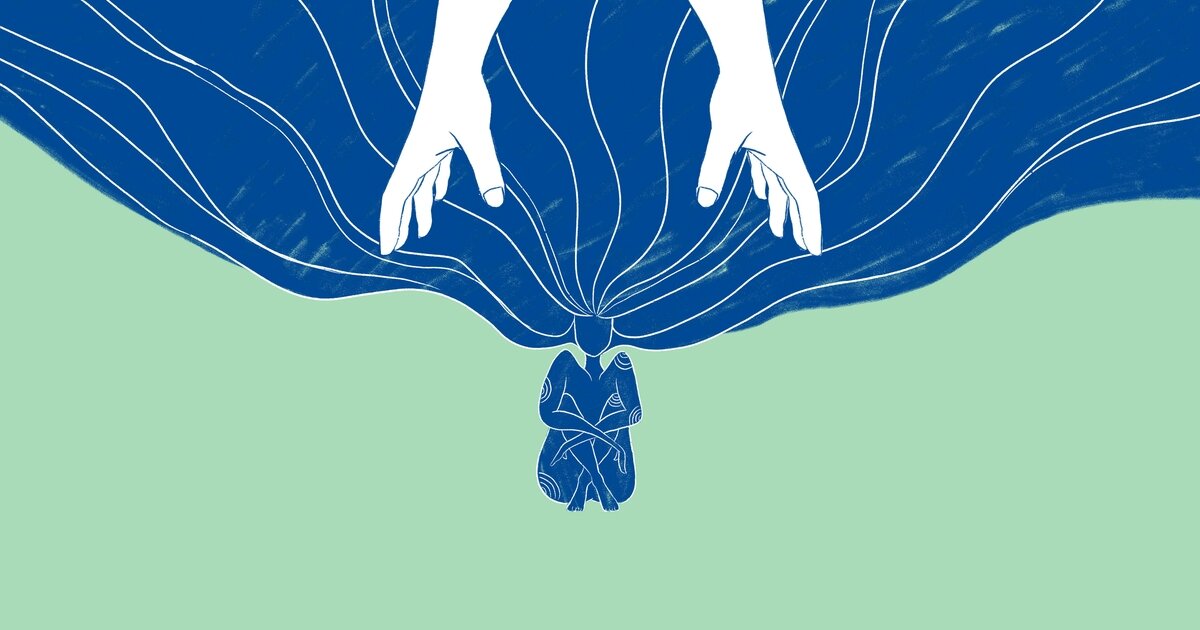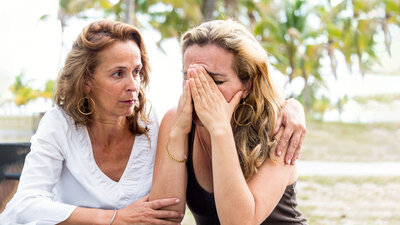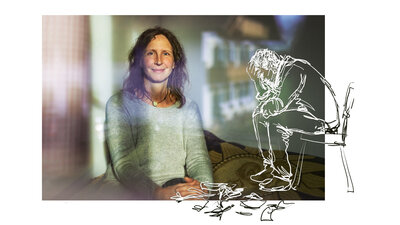
MHFA Course: How to Become a Mental Health First Aider?

When my mother first suffered from severe delusions, I was 19. Her schizophrenic psychosis had probably been building up over years. But when the illness took full effect, I was caught off guard.
My mother ran hectically through her apartment and had set up various altars – made of small home accessories, scribbled notes, cloths and stones. She avoided some rooms. She wasn’t comfortable with them. And she spoke – hissing, whispering – in voices I couldn’t hear, as if she wanted to scare those voices away.
Almost 30 years have now passed. But what I had to experience back then shocked me badly. I had to watch as my mother was taken to a closed psychiatric hospital by the police against her will – because of my actions. I was alone. There was no one to tell me, ‘You did that right. You helped your mother.’ Last year I heard for the first time about an MHFA course, a mental first aid course. And I inevitably asked myself the question: Could I have mastered my situation at the time better through such a course?
What are MHFA courses?
There are first aid courses for physical emergencies. They are even mandatory for the driving test. But what is the counterpart to the recovery position for psychological problems? “MHFA” stands for “Mental Health First Aid” – first aid for mental health. The program originally comes from Australia and is now offered in 29 countries.
Prof. Dr. Michael Deuschle introduced it in Germany. He is senior physician at the Clinic for Psychiatry and Psychotherapy at the Central Institute for Mental Health in Mannheim. Deuschle’s vision is “that every person in Germany attends such a course and that first aid for psychological problems becomes just as normal as for physical ones.”
This makes sense, because there is often a long time between the first appearance of psychological symptoms and assistance. This increases the suffering of those affected and delays recovery.
How can you take part in an MHFA course?
Throughout Germany, MHFA courses are offered either face-to-face or online. A course lasts twelve hours and is divided into different parts. This can be six two-hour online sessions or compressed into two long days on site. The course leaders are psychologists, psychological psychotherapists, psychiatrists and social workers with experience in the field of psychiatry. A maximum of 15 people form a course group.

How much does the MHFA course cost?
An MHFA course costs on average 220 euros. This is significantly more compared to conventional first aid courses. There you pay around 60 euros for the course duration of seven hours. The MHFA course is proportionally double. However, participants are provided with helpful material: such as a 260-page handbook with important information on individual mental disorders, contact persons and offers of help, as well as recommendations for action to support those affected. In another workbook, course visitors can take notes and record what they have learned.
What are the main focuses of the MHFA courses?
In the MHFA courses, mental illnesses such as depression, anxiety disorders, alcohol and drug addiction, suicidality and psychoses are discussed. The guidelines of the German Society for Psychiatry and Psychotherapy, Psychosomatics and Neurology (DGPPN) serve as a basis for preparing the individual disease areas. In addition, every course – regardless of who leads it – follows uniform guidelines. The content is licensed, which is intended to ensure quality and scientific verifiability.
How does a meeting work?
The meetings are structured similarly. At the beginning, basic knowledge about symptoms and risk factors is conveyed. Sometimes films are shown in which those affected describe their problems or in which symptoms such as delusions are made clear. Solutions should be developed together based on given problem situations.
Participants can practice first aid discussions in small groups. Role-playing games can be used for this purpose, for example. The course leader then slips into the role of the depressed colleague who withdraws more and more. One participant has the task of starting a conversation with her. He applies strategies that have been discussed in advance. We then discuss what was good and where there were uncertainties. The course leader answers any questions that arise.
We have often experienced that relatives do not address a problem out of shame or insecurity
What are the requirements for the MHFA course?
In principle, the MHFA course is aimed at laypeople. Accordingly, no prior knowledge is necessary. However, it is important to be mentally stable yourself. The MHFA course is not a self-help course and is definitely not therapeutic training. “It’s about providing initial support for people with psychological problems and abnormalities and, if necessary, referring them to professionals,” says Deuschle.
If in doubt, always go to your family doctor’s office, where you can get an appointment promptly. Or a crisis hotline. Anyone who is in the middle of a crisis with a mentally ill relative should seek individual help. The course cannot do that.
What is the aim of the MHFA courses?
The MHFA courses make participants aware of signs of mental health problems in their environment. You learn to talk to the affected person about it – and to make a plan with them about how to proceed. Above all, speaking up is a hurdle for many, says Deuschle: “We have often had the experience that relatives do not address a problem out of shame or insecurity.” Part of the course is also to reduce this shyness. There are now 29,000 MHFA first aiders in Germany, says Deuschle.
How useful is help from MHFA courses?
“For methodological reasons, it has so far been difficult to measure how the help is received by those affected. Because it is difficult to find out where and how psychological first aid will be used later,” explains psychiatrist Deuschle. However, meta-analyses have shown that the courses build knowledge and reduce stigma. For a good healing process, mentally ill people should be integrated and not confronted with prejudice. First aid courses for the psyche can certainly contribute to this.
How my course knowledge would have helped me 30 years ago? Looking back, I realize that I intuitively did a lot of things quite well. I was there for my mother. I didn’t leave her alone, I didn’t judge her. Back then, I even tried to get involved with the reality she experienced to some extent – to give her security.
Thanks to a fictional short film as part of the MHFA course, I can now imagine even better what my mother had to endure in her madness: the voices, the confusion and the fears. The situation would probably still be emotionally overwhelming for me today. After all, it’s about my mom. But now I have the tools to confidently face accusations and condemnations from my family environment. Enlightened and guilt-free.

Ethel Purdy – Medical Blogger & Pharmacist
Bridging the world of wellness and science, Ethel Purdy is a professional voice in healthcare with a passion for sharing knowledge. At 36, she stands at the confluence of medical expertise and the written word, holding a pharmacy degree acquired under the rigorous education systems of Germany and Estonia.
Her pursuit of medicine was fueled by a desire to understand the intricacies of human health and to contribute to the community’s understanding of it. Transitioning seamlessly into the realm of blogging, Ethel has found a platform to demystify complex medical concepts for the everyday reader.
Ethel’s commitment to the world of medicine extends beyond her professional life into a personal commitment to health and wellness. Her hobbies reflect this dedication, often involving research on the latest medical advances, participating in wellness communities, and exploring the vast and varied dimensions of health.
Join Ethel as she distills her pharmaceutical knowledge into accessible wisdom, fostering an environment where science meets lifestyle and everyone is invited to learn. Whether you’re looking for insights into the latest health trends or trustworthy medical advice, Ethel’s blog is your gateway to the nexus of healthcare and daily living.






